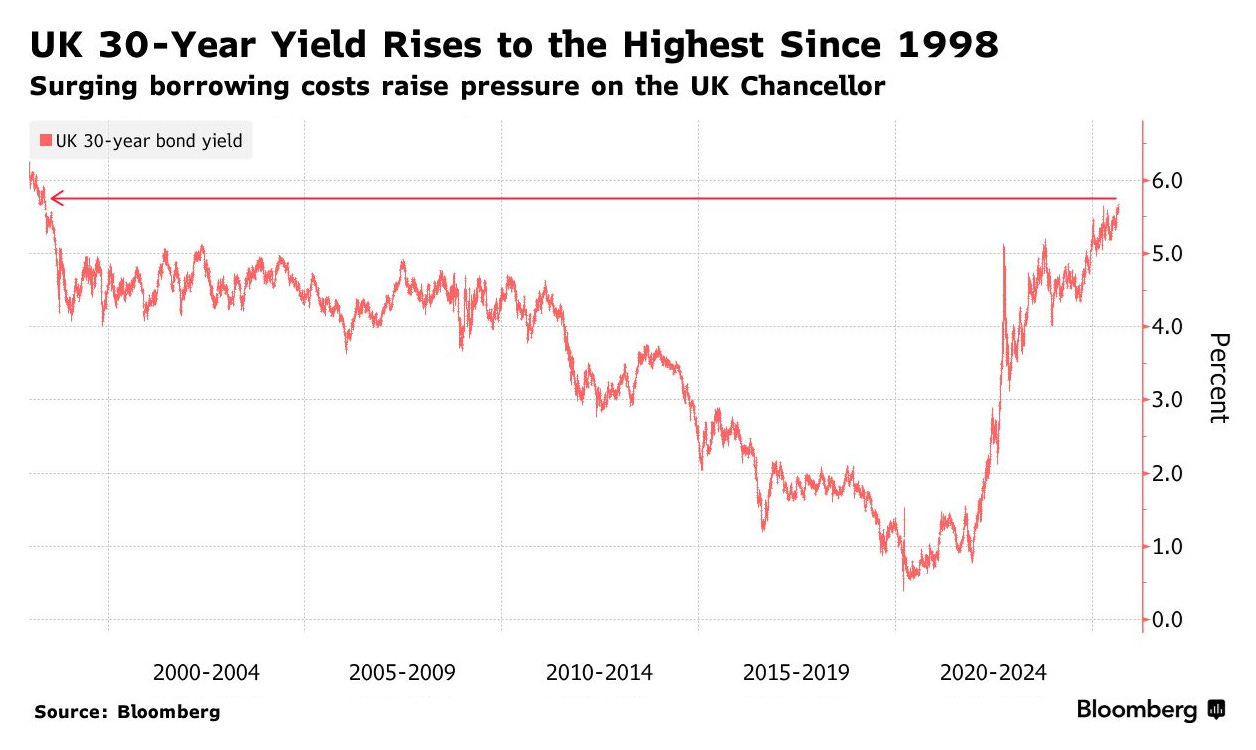Welcome to the fourth edition of the Trafalgar Analytics Data & Decision Insights. Our research associates and independent contributors will be covering the topical issues of the past month. We will be looking at how our decision makers think, as well as reflect on success stories and outline events to look forward to.
Agenda for this Insight:
Record UK gilt yields & markets nosedive, by our Economics Associate @rational_woden (Free)
Conference: Reform has a Tory Problem, by -B-, an Independent Political Analyst (Free)
Understanding China: What does the most powerful man you have never heard of think? (Free)
The PM’s New Economic Advisor, Labour Reshuffles and Deputy Leadership Election (Free)
Israel, Qatar and the Middle East: Watershed moment or business as usual? (Paid)
Future work to look out for… (Paid)
If you enjoy this Insight, do follow Trafalgar Analytics on Twitter or Substack, and give us a like or comment!
We begin by paying tribute to Charlie Kirk, Founder and Executive Director of Turning Point USA. He was shot and murdered on stage on 10th September 2025, whilst speaking to students in a Q&A session at Utah Valley University. Charlie was a free speech advocate, who went into university campuses to engage with people who disagreed with him; he believed that only real conversation would prevent violence. His death is a stark reminder that we often take for granted free speech in the West, and that there is a dangerous minority in our society, who do not share these values.
1) Record UK gilt yields & markets nosedive
A gilt (the name deriving from the gilt‑edged paper British government debt was originally issued on) is a UK government bond, issued by the Debt Management Office to fund government borrowing. The maturity of a gilt (for example, 30 years) represents how long until it is repaid, while the yield is the annual return the UK government must pay investors to hold such bonds.
Over the past week, we have seen long‑term gilt yields climb further on the back of sliding confidence towards UK fiscal policy. The 30‑year yield pushed above 5.7%, the highest since 1998, with markets slapping a “moron premium” on UK debt. Compare this to France, a state on the verge of collapse with governments unable to push through sensible fiscal measures, where the 30‑year yield is 4.5%. Or to Greece, the textbook “debt‑ridden” nation, which now borrows for 30 years at 4.3%.
Bond markets are not just venting frustration with a Labour government unable to rein in the tax‑and‑spend instincts of its backbenchers. Other forces are at work, and investors are starting to face up to them:
Central banks are unloading bonds. After years of quantitative easing (where central banks buy government debt to support the economy), they are now trying to shrink their holdings in a high‑rate environment. That means they need to tempt in buyers, who increasingly do not want the debt. (Why the UK did not refinance more during the Covid years at record‑low rates remains baffling…)
The private sector is waking up to structural risks. Ageing population, an ever‑expanding welfare state, and the winding down of defined‑benefit pension schemes (pensions that guarantee retirement income, regardless of investment performance) all point to weaker long‑term demand for gilts and greater fiscal strain (where government expenditure outpaces revenue).
The UK also has a unique vulnerability: an unusually high share of inflation‑linked gilts compared to peers. That means every bump in prices feeds straight into higher debt service costs.
All in all, without serious change in fiscal policy, long‑term rates are not coming down any time soon. And if they keep rising, Britain will not only have to pay more to service its debt, it will also have to find the economic growth to match it. This will be a tall order given the demographic issues outlined above.
—
By @rational_woden, 8th September, 2025.
Research Associate (Economy), Trafalgar Analytics Data and Decision Insights.
2) Conference: Reform has a Tory Problem
What fortune! A new right-wing party has come along with its own shade of blue, with a brand clear of blemish, without puss-filled buboes that burst under the utterance of the words “Fourteen Years”.
All kinds of people, big and small, now occupy space within Reform. In these ranks are many ex-Tories desperate for power and influence, and ready to re-run the whole sordid affair all over again - without any self-awareness. You may hear them speak in branch meetings; you may watch them on Talk TV or GB News; you may hear of their startling elevation to background power at the top of Reform - due only to their previously-established (Tory) connections. In spite of the disastrous consequences of their beliefs over the last five decades, their solutions to our problems are the same as they have always been.
It is not just a problem of welcoming a glut of ex-Conservative members, still proudly adorning their gilets, without any shame for their past political predilections. (Though that brings its own problems – how could it not?) A troupe of centre-right liberals have come to carry on the show, after finding that their former carnival had run its course and could no longer keep anyone’s attention.
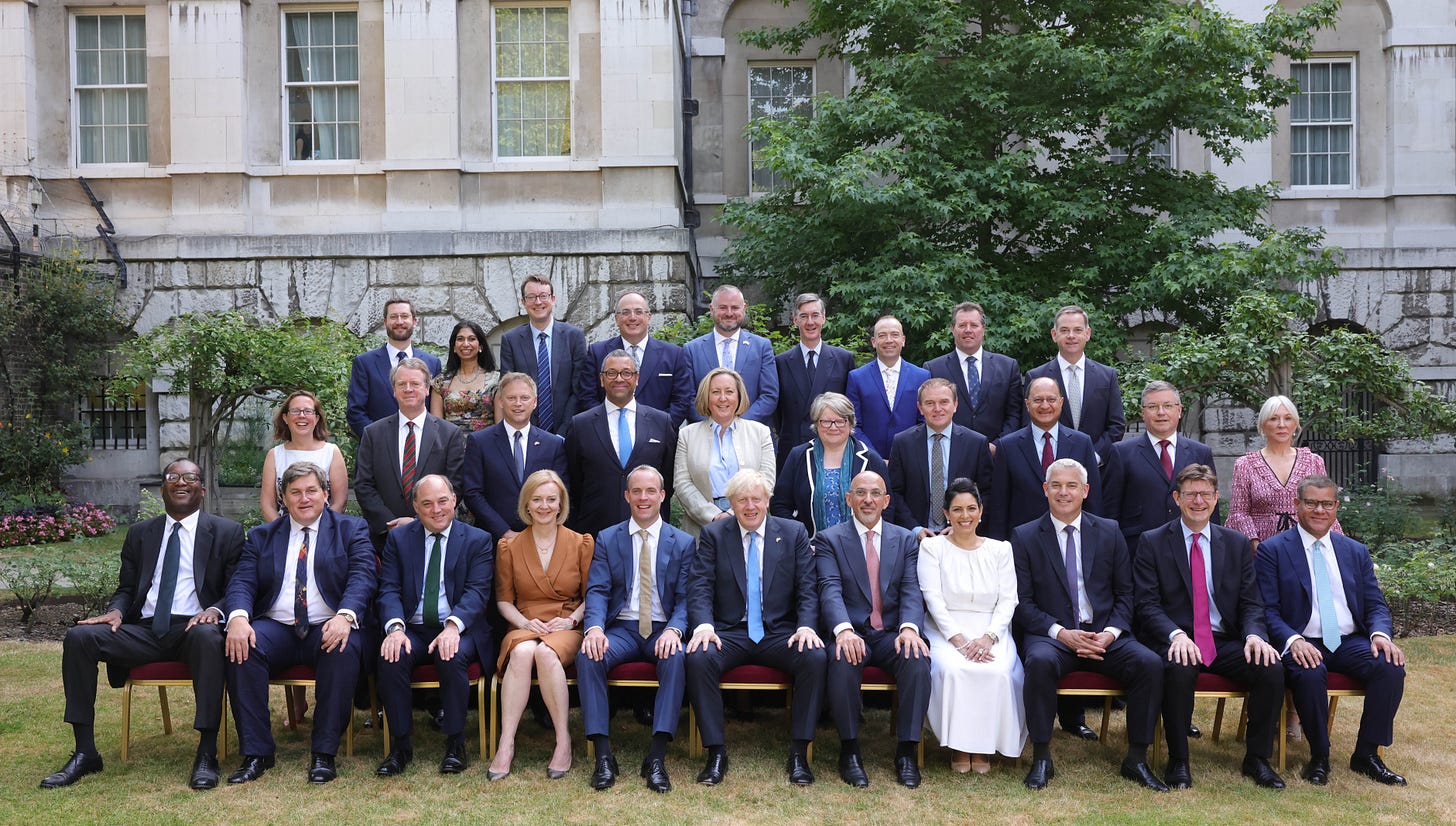
The nationalist right had always dreamed of a future in which its worldview would grow in popularity, with a greater number of people speaking its language. Instead, what Reform’s current poll numbers continue to show is that it has simply established itself as the successor to the Tory party. But, without a clean break from free market open-borders IEA-ASI-tinted libertarianism, can it fulfil its potential as a patriotic party that puts British interests first? Reform still has plenty of room to grow in the Tory-successor space, but does it need to? Should it want to? The party has inherited a slurry of bad rhetoric, talking points and policy priorities, which will take great care to successfully navigate away from.
Thanks to the centralised nature of Reform’s party structure, this should be something they can easily overcome. Nigel, with Zia as head of policy, can pitch an entirely new kind of right-wing politics detached from the old, regardless of the protestations of ex-Tories. As I outlined earlier in the year, the people at the top of Reform know they need to sell themselves to the electorate in a fundamentally different way, in order to win. Further to that, the people at the top of Reform know they need to govern in a fundamentally different way, in order to deliver. That is the heart of the Tory Problem. Reform will have to push through so much noise from ex-Tory donors, ex-Tory politicians and ex-Tory members. We should be witness to a honey-covered golem marching through a tunnel thick with wasps in pursuit of British nationalism. Are we?
A cursory glance at RefCon 2 indicates otherwise:
Big corporate sponsorships (positively received by the BBC!?);
A TaxPayers’ Alliance booth - extolling the virtues of stateless plutocracy;
A Prosperity Institute talk on “how can Reform succeed in office?” with PopCon’s David Starkey and Jacob Rees-Mogg — the Minister for Government Efficiency, who went around leaving passive aggressive notes on people’s desks.
Mogg’s admission to the conference, even as a guest, is a particularly worrying sign, not least because of the inevitable by-election in North East Somerset and Hanham. Current polling puts Reform ahead, but JRM is hoping his name recognition as the former local MP could carry him over the line. In Rees-Mogg’s recent post-conference video, he explains that he is in alignment with everything the Reform Party stands for, that Reform is really not that different from the Tory Party actually (??). Nationally, the degree to which Mogg’s assessment is true, is inversely proportional to how receptive the average person will be to Reform: the less like the Tories they are, the better.

Jacob Rees-Mogg should not be able to comfortably state that he feels affinity for Reform’s vision for the country, nor should a self-declared Boris Johnson ally, Nadine Dorries, be anywhere near the party, much less given a huge platform to spout her Telegraph-isms to a generally-unreceptive audience.
The reader probably does not need reminding: Zia and Reform have spent the last three months fighting the draconian Online Safety Bill, only for its principal architect to be welcomed in with open arms - without so much as an apology for her role in downplaying warnings four years prior to concerned journalists (Hadfield, 2021). To make matters worse, Dorries then told the Daily Mail, she hoped “Nigel Farage and Boris Johnson can put their egos aside and join forces”. Given the palpable silence between Nadine’s tired sentences, Reform still has enough of the old guard from the Brexit Party and UKIP days around for us to not be completely despondent at the state of its new membership. One day after this pronouncement, an unlikely trio of Arron Banks, Zia Yusuf and former-Conservative Home Editor Tim Montgomerie all came out to do damage control - reminding the public that “Boris Johnson was one of the worst PMs in history” and he would not be welcome in Reform.
The only scenario in which Tory Cabinet Ministers from 2019-2024 should be welcomed at RefCon 2 is one in which they apologise, Japanese-style to members. Last year, when Reform was polling sub-15%, welcoming Andrea Jenykins was a marginal call, if only for the extra name recognition. On 30%+ in the polls, what could the justification possibly be to bring Nadine in, when Reform is riding high? The only reason is to demotivate and introduce further divisions into the final season of the Parliamentary Conservative Party (leadership) personality contest. But, Reform has no need to entertain voices like Nadine, just like Mogg, who call for the need to “unite the right”. Why, pray tell, would we want that? The post-Thatcher liberal Tory party is dead. These people should want nothing to do with our party; they should be afraid of how far we might “reform” things.
The solution to this Tory Problem is a tricky one, I don’t envy Farage. He has to play a very delicate game in order to keep this grand coalition of uneasy bedfellows together. Cultivating “Reform Thought” or “Zianism” might be the best way to combat this. Reform will need a vanguard inside, and outside the party (including, explicitly pro-Reform think tanks and pressure groups) that hire across and beyond party lines, with the intention to promote radical and unconventional policy proposals. Through this process, Reform must reject Tory groupthink that often lock out good ideas, for being “left-wing ideas”. Maybe, most importantly, Reform Thought would need to also ignore the partisan divisions that lock in bad ideas, simply for being “right-wing ideas”. To rely on the shattered remnants of the Tory Party and the London Scene grift circuit for vision and direction would be a mistake, one that Reform cannot afford to make.
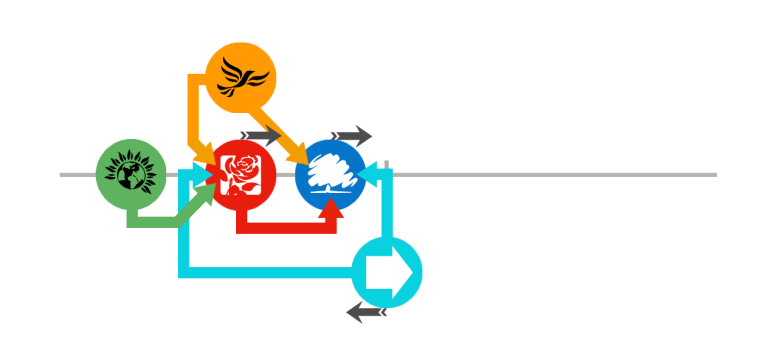
If Reform really is a new kind of politics that is neither left nor right, but common sense and patriotic, then let’s see the proof of that. Give us a RefCon 3 in which Novara Media has a booth. Give us a RefCon 3 that has union leader guest speakers. Give us a RefCon 3 mired by disgruntled ex-Tories disappointed with the “socialist” direction Reform is taking. Give us the toothy, anti-establishment party that rejects Tory and Labour dogmas, which even our enemies secretly wish we were. Live up to the rhetoric since the Winter Fuel Allowance cut, and embrace nationalist populism.
By -B-, an Independent Political Analyst, and anonymous Guest Contributor to the Trafalgar Analytics Data and Decision Insights.
3) Understanding China: What does the most powerful man you have never heard of think?
For the foreseeable future, China will be the principal security challenge to the Western liberal international order. This will affect us all, from the economy, energy, telecommunications, defence, to even socio-cultural norms. Understanding China vis-à-vis the West is as important as grasping the finer points of Russia-Ukraine, Israel-Palestine, or India-Pakistan — if not more so.
Last week, China welcomed twenty-four world leaders to the Shanghai Cooperation Organisation’s 2025 summit. The SCO, for the unacquainted, is billed as an international security, political and economic corporation organisation. Although many observers still struggle to understand its purpose, it can be best described as a talking shop or a looser version of an Asia-centred NATO, EU, or ASEAN.
This was the SCO’s largest summit to date. It raised eyebrows, not least for the appearance of international pariah Vladimir Putin (President of Russia) and the surprise attendance of Narendra Modi (Prime Minister of India). Modi’s attendance is arguably notable, due to tense Sino-Indian relations since the border clashes in 2020-21 (widely considered unresolved), which resulted in causalities on both sides and a freezing of economic ties.
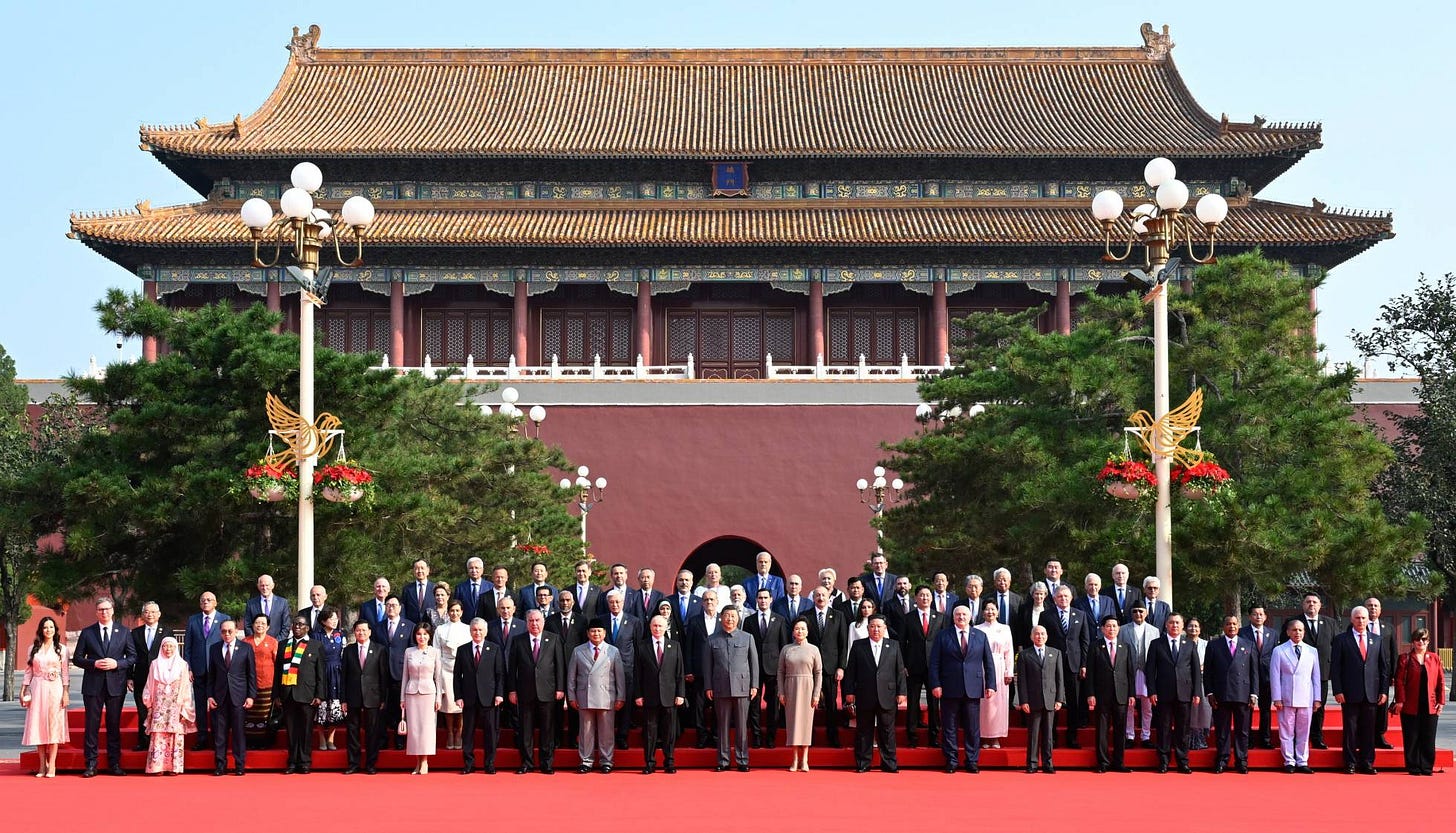
Shortly afterwards, President Putin and Supreme Leader Kim Jong Un (North Korea) attended China’s WW2 Victory Day Parade in Beijing alongside other world leaders. In a show of strength, China showcased its new laser, hypersonic, and drone capabilities, alongside its conventional arsenal.
A surface level analysis (such as those offered by The Newsagents / Rest is Politics) will suggest this series of events was Trump’s fault for pushing India towards China and Russia, and that North Korea and Russia were posturing against America. Whilst there may be an element of truth to this assessment, this view fundamentally misunderstands the significance of Xi Jinping and the Chinese Communist Party’s vision of the world. We will explain why.
First of all, Russia and North Korea was always going to attend. Second of all, whilst it is true that the fallout between America and India happened on President Trump’s watch, this was inevitable. Any America First movement (regardless of its leader) that wishes to reshore manufacturing, rebalance global trade, and reduce mass migration is fundamentally at odds with India’s core interests. India levies high tariffs on American goods, ties trade deals with increased Indian migration, and actively encourages diaspora to advance its interests abroad. To suggest that Trump should have placated Modi, would have betrayed the interests of his electoral base and the American working class. (Besides, there is a rapproachment soon.)
But what of the Chinese Communist Party’s worldview?
Xi Jinping did not walk into two consecutive diplomatic ‘victories’ because Trump blundered into raising tariffs on Indian goods. To understand China’s vision of the world, we look to Tanner Greer, the Director of the Centre for Strategic Translation. Greer observes that the CCP, like all mass organisations, must communicate its vision and directives to its 80-million strong membership clearly, which can be likened to an army. From this standpoint, the vast majority of what we need to understand about China is actually public information, if you know where to look, and are able to translate the texts.
Greer explains that Xi believes in what he calls the Laws, or Arc, of History, which bends towards (1) multi-polarisation, (2) economic globalisation, and (3) peaceful development. Xi accepts that there are “obstacles” to all three of these trends, but they cannot be overturned. Greer surmises that it is for the Party-State to “identify the forces of history that transcend any individual crisis and ensure that the Party-state moves with, not against, their development”.
“From a historical perspective, economic globalization is a result of growing social productivity, and a natural outcome of scientific and technological progress — not something created by any individuals or countries… there was once a time when China too had questions about economic globalization, but… we came to the conclusion that that integration with the global economy is a historical trend. … Whether you like it or not, the global economy is the great ocean from which you cannot escape. Any attempt to cut off the flow of capital technologies, products, industries, and people between economies and channel the waters of the sea back into isolated lakes and creeks is simply not possible. It runs counter to the historical trend.”, Xi Jinping, World Economic Forum, Davos (2017)
So what does this mean?
“Multi-polarisation” does not mean a direct conflict to overthrow the Western NATO-led order (that we associate with Russia), but rather building alliances and networks with other developing economies — inevitably limiting Western power projection. When China talks about multi-polarisation, it is not advocating to be a regional power confined to Asia with a defined sphere of influence (a common misconception), but for it to “build both the physical and intellectual infrastructure… to rewire the global order from a position of connectedness to it”.
“Economic globalisation” does not mean the free market liberal democracy that the WTO envisaged, when China joined in 2001. In the Governance of China (Vol. 2), Xi Jinping writes: “as China has increased its dependence on the world and its involvement in international affairs, so has the world deepened its dependence on China”. The implication is that economic globalisation is not just about “development, but corruption and economic coercion are valued means of national restoration”.
“Peaceful development” does not mean a world free of Chinese coercion, but a China confident that conventional military tools can not achieve its strategic interests (think economic / political coercion, instead). Xi Jinping admitted as much in 2013, the same year he became President: “the path of peaceful development is the Party’s strategic choice in line with the times and aligned with the fundamental interests of the country”. Greer notes that “China’s commitment to peaceful development rests on its leader’s belief that globalization and economic integration is an irrevocable historical law”.
“A prosperous and stable world provides China with opportunities… whether we succeed in our pursuit of peaceful development to a large extent depends on whether we can turn opportunities in the rest of the world into China’s opportunities.”, Xi Jinping, first speech as Chinese Communist Party General Secretary (2012)
The unanswered question is whether China will be quite as committed to “peaceful development”, if the arc of history decisively moves away from being a prosperous and stable world?
To understand the course of China’s international relations across the decades, we must understand the real thought leaders behind the scenes, in particular Wang Huning, a man who in many ways predates Xi Jinping.
Wang was a university professor, known for his book America Against America (1991) covering his observations of America’s socio-cultural and economic contradictions (many of which analysts observe, have been mirrored in contemporary China). In 1995, he was brought into the Central Policy Research Office, as Head of Political Research. He later rose to Deputy Director (1998), before becoming Director in 2002 until 2020. In this capacity, he headed policy for three consecutive Chinese Presidents: Jiang Zemin, Hu Jintao, and Xi Jinping. Today, Wang serves as the 10th Chairman of the Chinese People’s Political Consultative Conference, the Chinese-equivalent of the House of Lords or the US Senate. (N.B. The 1st CPPCC Chairman was none other than Mao Zedong, the revolutionary).
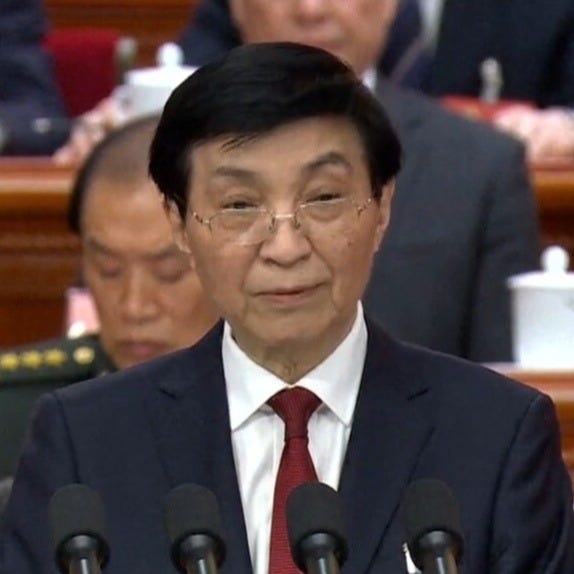
Throughout this time, Chinese foreign policy has been built around the CCP’s understanding of the ‘inevitable’ Laws of History. To that end, Wang Huning has been the major intellectual force behind much of China’s foreign policy levers, from the “Community of Common Destiny”, “China Dream”, “Common Prosperity”, “Chinese-style Modernisation” to “Xi Jinping Thought”. Tools designed to advance multipolarity include the Belt and Road Initiative, SCO, BRICS, the New Development Bank, the Asian Infrastructure Investment Bank, the Global Security Initiative, the Global Development Initiative, and the Global Civilisation Initiative. The impact of these bodies have ranged from successful to non-existent. However, this points to a plethora of China-led bodies waiting in the wings, with intent, should any Western-led institution falter for any reason.
From this lens, the appearance of Modi, Putin, Kim Jong Un, and other world leaders in China last week, is not an shock ‘win’, but a broadly expected outcome. Putin and Kim Jong Un represent isolated countries, who rely on China, as are countless other Asian and African state leaders in attendance. Only Modi could count as a surprise, but fundamentally, India’s strategic interests were always going to see it veer between the great powers, and come head first into an America First movement focussed on rebalancing trade, manufacturing, and migration.
By Eulipotyphla_OG - Founder, Trafalgar Analytics.
4) The PM’s New Economic Advisor, Labour Reshuffles, and Deputy Leadership Election
“Your own are more likely to cancel you.”, Curious Gazelle, 7th June 2023.
This has been a consistent theme of politics in Britain and the world over.
Angela Rayner’s story as Deputy Prime Minister is a tale as old as time. Yes, she was a hypocrite for accusing tax avoiders of killing people, only to avoid tax herself. Yes, she was a hypocrite for calling for Jeremy Hunt to resign over stamp duty, only to avoid stamp duty herself. Yes, she was a hypocrite for going after Nadhim Zahawi’s family, only to complain about others for bringing her family into the story.
But, as Deputy Prime Minister, she simply followed the footsteps of her predecessor, Dominic Raab. As a refresher: Dominic Raab faced allegations of bullying, after he demanded higher standards from his civil servants. It later emerged the allegations were a damp squib, amounting to startling staff whilst binning three cherry tomatoes from his salad, and that he had apparently spoken in a “curt” manner.
With a 80-seat majority, Rishi Sunak did not need to fire Raab for these politically trumped-up charges. But in a Pontius Pilate fashion, he outsourced his decision to an independent ethics advisor, who concluded that Raab had broken the ministerial code. This was particularly convenient for Sunak as Oliver Dowden (Rishi’s preferred choice for Chancellor) was then promoted to the Deputy Prime Minister straight after.
There are two lessons in this: (1) you are only cancelled if your own side chose to let you go - the importance of good relationships in the public sphere can not be understated, and (2) it may seem cowardly for leaders to off-load political decisions to independent inquiries, but if that ever happens, the authority-in-question is either trying to delay a decision to a more convenient time or knows the outcome of the inquiry already, or both.

In this regard, the political commentator Camillo of First Reading, theorises that: “Rayner's ideological opponents are capitalising on this, but it was definitely someone in her own circle who leaked and shared stuff with the press.” If Keir Starmer had wanted to keep her, he could have. Rayner had already been priming the public to redirect their anger towards her into being sympathetic for her children, in a softball interview on Sky News with Beth Rigby. But, Rayner’s tenure was clearly over, as soon as Keir publicly declined to come out in defense of his deputy, and deflected to his independent ethics advisor. Cowardly of Keir or not, the advisor duly wielded the knife, and ruled that she had broken the ministerial code.
Starmer was certainly not slow to take advantage of this, and set about his first full Cabinet Reshuffle. This would be his 24th ‘Reset’ since becoming Prime Minister, shortly following his 23rd Reset, when he changed his Number 10 advisor team a week prior, at the start of September. Unfortunately for Keir, he can reset his team and messaging as many times as he wants, but will still struggle to push through any contentious bills with his parliamentary arithmetic. None-the-less, it is worth us understanding the last two ‘resets’.
—
Reset 23 involved very little ministerial movement, apart from Darren Jones moving from Chief Secretary to the Treasury to Chief Secretary to the Prime Minister (a kind of glorified Chief of Staff role). The most significant decision was to bring in Baroness Minouche Shafik as Chief Economic Advisor to the Prime Minister. This was a significant move to reassure the markets, especially in the backdrop of a very beleaguered Rachel Reeves - probably the most underqualified Chancellor of the Exchequer in British history (famous for lying on her CV).
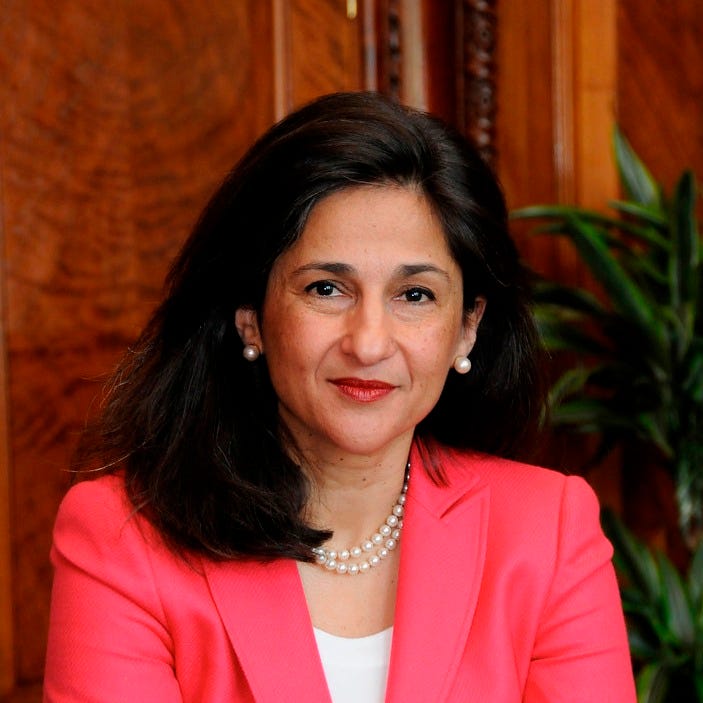
In contrast to Reeves, Shafik’s record is so extensive and impressive that at the time of writing, her promotion to Chief Economic Advisor for Number 10, has not even appeared on her Wikipedia page. Prior to this role, Shafik was President of Columbia University, President of the LSE, Deputy Managing Director of the International Monetary Fund, Deputy Governor of the Bank of England, the youngest ever Vice President at the World Bank, a former Adjunct Professor at Georgetown, with an Economics PhD from the University of Oxford. (Her biggest controversy was at Columbia University, when she faced down pro-Palestinian student protestors, declined to ‘divest from Israel’, and invited NYPD onto campus. All things considered, as she is an Arab woman, this was a brave step, which she paid heavily for. Her academic colleagues condemned her, and she eventually resigned.)
On a professional level, any one of her past seven credentials would qualify her for this new role. In practice however, we will expect a conventional approach to fiscal and economic policy: more of the same, but perhaps, in a slightly less damaging way. We already have a hint, when she told Andrew Marr earlier this year that the Labour’s manifesto pledges should be dropped, to improve Britain’s anemic growth. She called for taxes on businesses (employer’s NI, etc) to fall, but a rise to VAT and personal income tax. If so, we expect the squeezed middle to be even more squeezed, but an attempt to give businesses some extra breathing space.
Miraculously, Rachel Reeves survived both of Starmer’s 23rd and 24th Reset. Whether the relationship between the Prime Minister’s Chief Economic Advisor and the Chancellor, will shape towards a positive direction is anyone’s guess. But the gulf in intellect between the two most important decision makers for Britain’s prosperity has never been wider. For the long haul, the fallout between Margaret Thatcher’s Economic Advisor, Alan Walters and her Chancellor, Nigel Lawson could be prescient. In the end, they both resigned.
—
Reset 24 was lot more exciting for the media; the public are usually much more interested in who’s up and who’s down in the governing party.
The short version is that the whole Cabinet played musical chairs, but only one Cabinet Minister (Lucy Powell) was actually fully fired (and, rightly so). Lucy Powell is no stranger to Trafalgar Analytics’ Data and Decision Insights, appearing for her undignified role in downplaying the rape / grooming gangs scandal (Insight #2). Whilst serving as Leader of the House of Commons earlier this year, she told the journalist Tim Montgomerie that it was a “dog whistle” issue, and that he was “blowing that little trumpet”. It attracted the second-worst headlines incurred by this Labour Government on the rape gang scandal, behind perhaps the Safeguarding Minister (Jess Phillips) declining Elon Musk’s calls for an independent national public inquiry.
Naturally, this is no red flag for the Parliamentary Labour Party. Following Angela Rayner’s resignation, in the ongoing Labour Party Deputy Leadership Election, the party has seen fit to nominate Lucy Powell into the final two. 117 MPs signed her nomination.
In the meantime, the frontrunner, Bridget Phillipson (Education Secretary) has 175 MP nominations. This is somewhat impressive, not least because she had only recently being implicated in the Labour Party Freebies Controversy. Phillipson famously accepted £14,000 from Lord Alli to organise a "professional” festive event on the same day as her birthday, but told Sky News it was not a birthday party. Following that, she admitted to accepting free Taylor Swift tickets, because "it was a hard one to turn down... one of my children was keen to go”. With the MP nominations having closed, it will be the constituency and members’ choice next, for Deputy Party Leader.
As to the newly promoted Deputy Prime Minister and Justice Secretary, it will be interesting to see which version of David Lammy the country will get. Will it be the David Lammy who called for Black fathers to be more present in their childrens lives? Will it be the David Lammy who suggested that “absent fathers” were the key cause of knife crime? Will it be the David Lammy who later called Rod Liddle a “disgrace” for suggesting the same thing seven years later? Or, will it be the David Lammy who said that there were “no police on the streets” whilst a policeman walked past him?
On the new Home Secretary, Shabana Mahmood, the jury is out on how she will do as the first female Muslim in the role. She faces an unenviable position of having to hold the Government’s line of proscribing Palestine Action, whilst independent pro-Gaza candidate Ahmed Yakoob is in her constituency of Birmingham Ladywood campaigning to oust her. He came 3,400 votes of toppling her in 2024, and is predicted to triumph in 2029. In the same general election, her neighbour Jess Phillips was shouted down at her own count, by opponents running on a similar platform. In the long run, Labour will struggle to face down this onslaught.

Ones to look out for: From the 2024 parliamentary intake, Mike Tapp (who made his name, as one of Labour’s younger social media attack dogs) has been promoted to Migration and Citizenship Minister. With a background at the Intelligence Corp, National Crime Agency, and the Ministry of Defence, he will be one to watch. It seems whilst the Conservative Party may have Tom Tugendhat and Tobias Ellwood, the Labour Party has Mike Tapp... In the meantime, Labour royalty, Georgia Gould (daughter of Lord Gould, and Alastair Campbell’s mentee) has been promoted to Schools Minister.
5) Israel, Qatar and the Middle East: Watershed moment or business as usual?
Earlier this week (9th September 2025), Israel struck Doha, the capital of Qatar. This was an unprecedent attack on the sovereign territory of an American and British ally, in a city full of expats. At the height of Pax Britannia, the Royal Navy would have been deployed for less - to maintain order. Today, the international community is almost lost for words after twenty-two months of Israeli military action in Gaza: an expanding conflict, no clear path towards a ceasefire, and only strongly-worded statements to show for it.
In this Insight, we seek to understand the prevailing views, it is possible one or more of these theories are true. The region is one of multiple conflicting rivalries and temporary alliances.
1 - The Rogue State View
This is your standard Rory Stewart-esque (puts-serious-cap-on) view: Israel has broken international law, operated inside the territory of a sovereign territory without consent, and this is a thin end of the wedge to the current international order breaking down!


